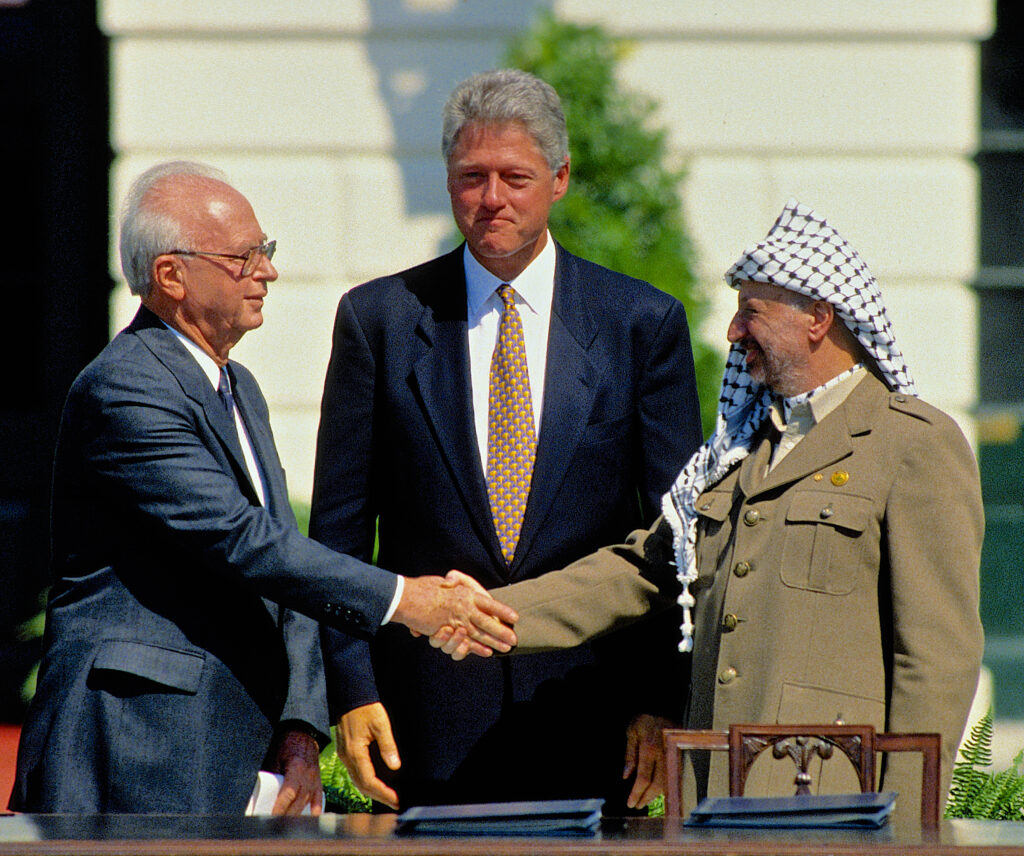Australia/Israel Review, Featured
Editorial: The Oslo Years
Aug 30, 2018 | Colin Rubenstein

Twenty-five years ago this month, Israeli Prime Minister Yitzhak Rabin and Palestine Liberation Organisation Chairman Yasser Arafat shook hands on the White House lawn, setting in motion a framework for peace negotiations known as the Oslo Accords (because it was based on secret negotiations held in Norway.)
Rabin made his intentions abundantly clear in the remarks he addressed to the Palestinians at the signing ceremony; “We are destined to live together, on the same soil in the same land… we who have come from a land where parents bury their children, we who have fought against you… Enough of blood and tears. Enough.”
Expectations worldwide, and in Israel, were sky high. It seemed the long-running Israeli-Palestinian conflict could soon be resolved.
That didn’t happen, yet the conflict was certainly transformed by those events on the White House lawn.
The Sept. 1993 Declaration of Principles represented only the first of several major agreements with the Palestinians undertaken by successive Israeli governments of all complexions which collectively make up the Oslo agreements. By the time final status talks began several years later, over 90% of Palestinians in the West Bank and Gaza had been living in areas both secured and administered by the PLO-led Palestinian Authority (PA) for some time.
So why has a final two-state resolution still not eventuated a quarter of a century later?
Arafat’s post-Oslo behaviour offers one clue. He vacillated between messages of peace or conquest depending on the audience. In speeches to Arab and Muslim audiences in the mid-1990s, he compared the Oslo Accords with the Hudaybiyyah peace treaty – a 10-year truce reached by the Prophet Muhammad with his enemies, which he reneged on when convenient – and said his real goal was to “to eliminate the state of Israel” and establish “a united Palestine under Arab rule.”
While the assassination of Rabin by a Jewish extremist in 1995 was certainly a setback, the real watershed came in 2000-2001. That’s when Arafat not only rejected two peace offers from Israeli PM Ehud Barak, and a bridging proposal from US President Bill Clinton – but made a secret decision to launch a terrorist intifada instead. These events shattered, for the time being, hopes of peace for the majority of Israelis – and deprived Arafat’s own Palestinian people of the statehood that was clearly on offer.
As Saudi Prince Bandar reportedly told American negotiators during this period, “if Arafat does not accept what is available now, it won’t be a tragedy, it will be a crime.”
Restoring security for Israel’s citizens following Arafat’s second intifada, which took the lives of over 1,000 Israelis in suicide bombings, shootings and other attacks, unavoidably impacted the lives of ordinary Palestinians – through the construction of the West Bank security barrier, checkpoints and IDF missions into PA-controlled areas to arrest suspects.
Arafat’s successor Mahmoud Abbas – while differing from Arafat in opposing terrorism as a Palestinian tactic – has been no more amenable to ending the conflict. Abbas’ casual rejection of PM Ehud Olmert’s offer in 2008 – Abbas himself said in 2015 he rejected it “out of hand” – a proposal then US Secretary of State Condoleezza Rice wrote was so far-reaching it was “unbelievable”, was followed by several further rounds of talks with Israeli negotiators, each cut short by Abbas.
His pursuit of a unilateral strategy to delegitimise Israel, and effective refusal to negotiate in recent years, has prolonged the stalemate.
Previously, a 2005 Israeli attempt to unilaterally move toward a two-state resolution backfired badly. Israeli Prime Minister Ariel Sharon removed all Israeli soldiers and civilians from Gaza and one segment of the West Bank. The result was the Iranian-supported Islamist terror group Hamas won a parliamentary election then seized sole control of the Gaza Strip in 2007. Hamas used the security vacuum created by the IDF’s withdrawal to militarise the densely populated coastal enclave – first with crude rockets, and later long-range missiles and terror tunnels – and instigate repeated wars that cynically exploited Palestinian suffering for political gain.
Meanwhile, this reality of two separate, rival Palestinian entities raises the question of whether any single Palestinian leader has, or will ever again have, the mandate from the Palestinian people to make concessions for peace and statehood on their behalf.
Yet in evaluating the “Oslo era”, there are definitely some positive achievements – even if much of that history has been violent and bloody, and peace still appears distant.
The Oslo Accords empowered Palestinians, allowing them to live under their own rulers and enshrining their right to self-determination in some form as the consensus policy of Israel’s major political parties, and internationally. It is worth noting that, despite often intense and pointed debates, almost nobody in Israel supports a return to the pre-1993 status quo.
Oslo’s other legacy is 25 years of lessons learned – admittedly often at a terrible price – primarily about the inability, unwillingness and unreadiness of the Palestinian leadership, and indeed, much of the society they represent, to reach a stable and lasting two-state peace deal with Israel.
Easily debunked claims often heard about the growth of settlements supposedly making a two-state peace impossible should not detract from those lessons. Nor should we forget the need to focus any new moves toward peace on achieving the significant transformations to Palestinian society, culture and governance that would make a lasting two-state resolution possible.
Given the last 25 years, it is not surprising that many political actors, inside and out of Israel, are now thinking “outside the box” about a post-Oslo way forward. But it would be a mistake not to recognise that, however long it takes, or however one gets there, the two-state-for-two-peoples paradigm – which Oslo made the consensus both in Israel and internationally – still remains the only possible endgame that is both sustainable and just.
Tags: Israel, Palestinians






